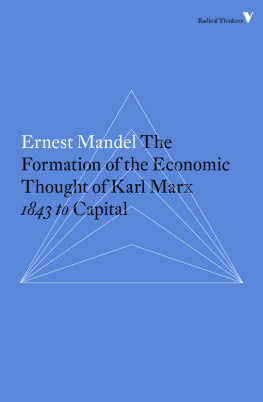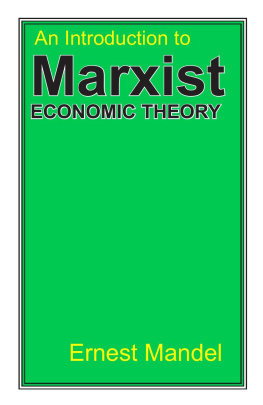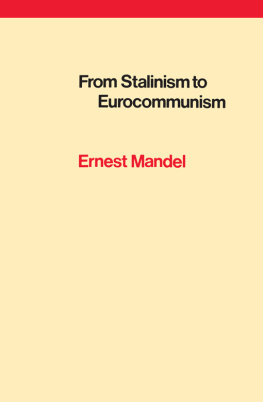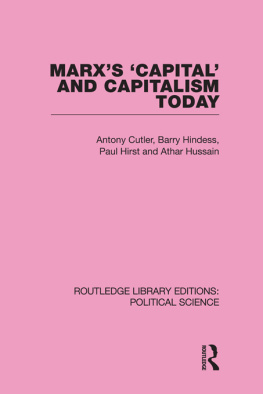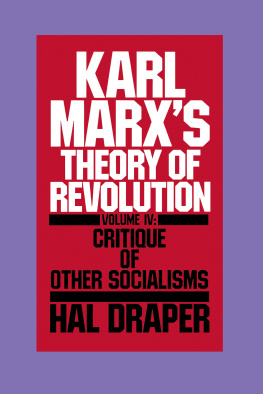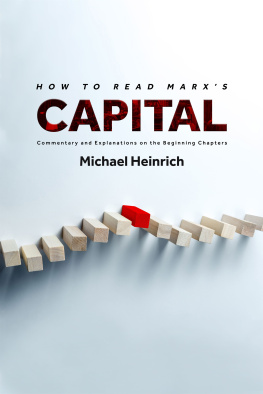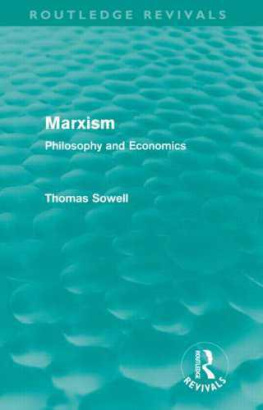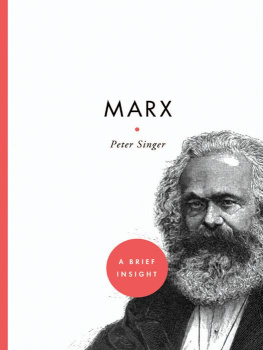
The Formation of the
Economic Thought
of Karl Marx
Ernest Mandel

The Formation of the
Economic Thought
of Karl Marx
1843 to Capital

Translated by Brian Pearce

This edition published by Verso 2015
First published in English by Modern Review Press 1971
First published as La Formation De La Pense conomique De Karl Marx
Librairie Franois Maspero 1967
Translation Brian Pearce 1971, 2015
All rights reserved
The moral rights of the author have been asserted
1 3 5 7 9 10 8 6 4 2
Verso
UK: 6 Meard Street, London W1F 0EG
US: 20 Jay Street, Suite 1010, Brooklyn, NY 11201
www.versobooks.com
Verso is the imprint of New Left Books
ISBN-13: 978-1-78478-232-0 (PB)
eISBN-13: 978-1-78478-233-7 (US)
eISBN-13: 978-1-78478-234-4 (UK)
British Library Cataloguing in Publication Data
A catalogue record for this book is available from the British Library
Library of Congress Cataloging-in-Publication Data
A catalog record for this book is available from the Library of Congress
Printed in the US by Maple Press
To Gisle,
who enabled me to write this book as a happy man
Contents

From the Critique of
Private Property to the
Critique of Capitalism
Marx and Engels did not travel the same route to arrive at the ideas they came to share. They had in common the same philosophical starting point, namely, Hegels dialectics, [Bruno] Bauers self-consciousness, and Feuerbachs humanism; they then made the acquaintance of British and French socialism, but whereas this became for Marx the means whereby he ordered his thoughts regarding the struggles and aspirations of his epoch, for Engels the same role was played by British industry.
This difference resulted, no doubt, from differences in character and temperamentthe more speculative nature of Marxs genius, the greater impetuousness of Engels. Chance and material circumstances also played a part, however. While Marx emigrated from Germany to France, Engels was sent to England to learn the conduct of business affairs, and there came into contact with the reality of large-scale capitalist industry. It was the shock of this encounter with the contradictions of bourgeois society that was to decide the course of his thinking for the rest of his life.
If Marx developed almost unaided the entire economic panel of Marxist theory, it is to Engels that the credit is due for having been the first to urge Marx to take up the study of political economy and for having grasped, in a brilliant sketch, the central importance of this science for communism. It must be emphasized that it was also Engels who, though two years Marxs junior, was the first to declare himself openly a communist and to regard as necessary and inevitable a radical revolution which would abolish private property.
As early as the end of 1842, when he was only just twenty-two, Engels ended an article on the Prussian monarchy by predicting a bourgeois revolution, and began an article on Britain by announcing the approach of a social revolution. Nevertheless, the two founders of scientific socialism were already attacking the problem from the same angle: by criticizing the neo-Hegelian conception of the state, by discovering the existence of social classes, and by analyzing the inhuman effects of private property and competition.
We are able in both cases to follow the trajectory of their thinking from point to point: from criticism of religion to criticism of philosophy; from criticism of philosophy to criticism of the state; from criticism of the state to criticism of societythat is, from criticism of politics to criticism of political economy, which led to criticism of private property.
With Marx, however, the purely theoretical aspect was to remain predominant throughout this period, and the evolution of his thought was to result in the Introduction to the Critique of the Hegelian Philosophy of Right (end of 1843 and beginning of 1844). With Engels it was the practical aspect, the criticism of British bourgeois society, that took the ascendancy, both in the Outlines of a Critique of Political Economy and in Die Lage Englands (The Condition of England), which appeared in the journal Deutsch-Franzsische Jahrbcher at the same time as Marxs well-known critique.
It is generally accepted that Marx took little interest in political economy during his university studies. The list that has come down to us of the books he studied while at Berlin university does not include a single one devoted to this subject.
Nevertheless, Pierre Naville is right in seeking to mitigate the excessively hard-and-fast character of this view. In fact, Hegel himself had been profoundly affected in his youth by economic studies, in particular by the work of Adam Smith;
Marx had already moved from philosophy to politics, the first step in his intellectual development, when he became editor of the Rheinische Zeitung in 1842. His fundamental position continued to be one of struggle for a human state; he still took his stand on human rights in general, on the struggle against feudal survivals. Like Hegel, he considered that the state should be the realization of freedom.
Marx had already grasped that private property, to the defense of which the state seemed to wish to devote itself exclusively, resulted from a private, monopolistic appropriation of a common asset.
From this first entry into the subject, a political critique then led the young Marx to the threshold of a criticism of civil society, a criticism of political economy. Before crossing this threshold, however, and immersing himself in the subject that was to be the chief preoccupation of his life as a scholar, he seemed to feel a constant need to look back, to retrace his steps, to make sure he had not missed any alternative solution, and to settle finally with all the ideologies he had just outgrown. During the two years between October 1842, when he began his articles on the Debatten ber das Holzdiebstahlgesetz (Debates on the law against the stealing of wood), and the beginning of his studies in political economy, undertaken in Paris, the young Marx was to draw up a balance sheet of the two movementsHegelian philosophy and utopian socialismthat he had to transcend before he could give his own ideas a definitive form. (The term transcend must be understood here in its Hegelian, dialectical sense, which implies that all that is valid in the positions transcended remains preserved in the new positions.)
In order to help understand how the young Marxs economic ideas evolved, it is interesting to trace the origin of his concern with social questions. Having first discovered their existence through the poverty of the Moselle vinegrowers and the debates about the wood-thieves, he began to run into them at every step as he started on a detailed criticism of Hegels philosophy. He found that the estate of direct labor (der Stand der unmittelbaren Arbeit

